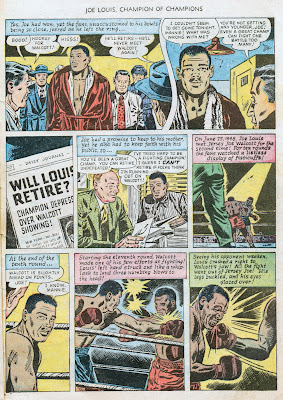
The second story in Fawcett's
Negro Romance 2 is "Forever Yours", and features art by Rudy Palais. The story was again written by Fawcett editor Roy Ald. In this typical romance tale, everything is heading towards 'happily ever after' for this middle class couple, when Edith's whole vision of the future is changed as she learns she has an unspecified, difficult to treat, fatal illness. Faced with the prospect of a mere two years remaining, she switches to party mode, to squeeze out as much enjoyment as possible from the life she has left. Unfortunately this all-out hedonistic pursuit blinds her to the real treasure she has in Don's love, and she even ditches him to go dancing with some random guy who hits on her. Eventually Edith's illness overcomes her, the truth is out, and she finally gets the treatment she needs. It will be a long journey back to good health, but with Don by her side Edith feels sufficient strength to see it through. It is not clear why she didn't start treatment as soon as she learned of her illness, but then we wouldn't have had that section of the story where she loses the plot. So this story falls right in line with the mood and approach taken by Fawcett's other romance titles from the period.








There are no white people in the story (or in the whole comic) and so we
get a glimpse of the other half of segregated America in the early
1950s. There is nothing in the way of negative stereotyping of African
Americans here - the characters in the story are handsome, well-dressed,
obviously have a decent income, etc. So the story simply acknowledges
and accepts segregation as an existing condition, and does not
interrogate or analyze it. Inasmuch as the characters are not depicted
as in any way inferior to whites, it could be argued that it is
demonstrative of the separate but equal ideal of some
pro-segregationists. But the mere fact that Fawcett printed a comic
specifically for a black audience (and partly drawn by a black artist)
indicates that
Negro Romance is really acknowledging the
existence of the African American community, who are absent in the vast
majority of other comic books. Had African American women of the early 50s been 'looking for a face like theirs', as did Prof William H. Foster III when he read comic books in the 1960s, they would have found what they were looking for in
Negro Romance. But clearly the title was not a commercial success, as it folded after issue 3. Rare beyond belief,
Negro Romance is nevertheless a true milestone in comic book history.
It is actually the first title published by a mainstream comic book
company featuring only black characters, in addition to being one of the
few comics that featured African Americans in non-stereotyped, non-demeaning imagery from the middle decades of the twentieth century.
One thing I noticed as I continued to scan the book was the absence of ads. If there had been any, they would have to have been on the cover (back and inside), which alas I don't have. I'll have to check to see if that was the standard layout for Fawcett romance comics from that time.
 The third story in Fawcett's Negro Romance 2 is "Love's Decoy", again written by Roy Ald, with art by deservedly, but posthumously and belatedly, celebrated African American comic book artist Alvin Hollingsworth.
The third story in Fawcett's Negro Romance 2 is "Love's Decoy", again written by Roy Ald, with art by deservedly, but posthumously and belatedly, celebrated African American comic book artist Alvin Hollingsworth.


























































